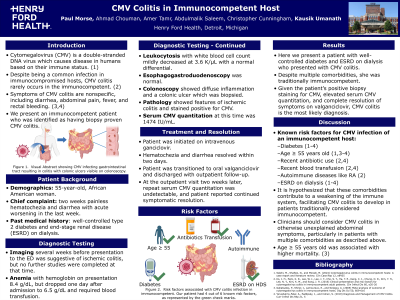Monday Poster Session
Category: GI Bleeding
P2477 - CMV Colitis in Immunocompetent Host
Monday, October 28, 2024
10:30 AM - 4:00 PM ET
Location: Exhibit Hall E

Has Audio

Paul Morse, PhD
Wayne State School of Medicine
Detroit, MI
Presenting Author(s)
Paul Morse, PhD1, Ahmad Chouman, 1, Amer Tamr, MD2, Abdulmalik Saleem, MD2, Christopher Cunningham, MD2, Kausik Umanath, MD, MS2
1Wayne State School of Medicine, Detroit, MI; 2Henry Ford Health, Detroit, MI
Introduction: Cytomegalovirus (CMV) is a double-stranded DNA virus which causes disease in humans based on their immune status. Despite being a common infection in immunocompromised hosts, CMV colitis rarely occurs in the immunocompetent. Symptoms of CMV colitis are nonspecific, including diarrhea, abdominal pain, fever, and rectal bleeding. We present an immunocompetent patient who was identified as having biopsy proven CMV colitis.
Case Description/Methods: A 55-year-old woman with a history of well-controlled type 2 diabetes and end-stage renal disease (ESRD) on dialysis presented to the hospital with painless hematochezia and diarrhea for two months with acute worsening in the last week. Imaging several weeks before presentation to the ED was suggestive of ischemic colitis, but no further studies were completed at that time. Her hemoglobin on presentation was 8.4 g/dL. The next day, her hemoglobin dropped to 6.5 g/dL requiring blood transfusion. The patient’s white blood cell count was mildly decreased at 3.6 K/μL with a normal differential. She underwent esophagogastroduodenoscopy, which was normal, and colonoscopy, which showed diffuse inflammation and a colonic ulcer which was biopsied. Pathology showed features of ischemic colitis and stained positive for CMV. Serum CMV quantitation at this time was 1474 IU/mL. She started intravenous ganiciclovir, which was transitioned to oral valganciclovir at discharge. Upon outpatient follow up two weeks later, the patient reported compliance with the valganciclovir and resolution of her symptoms. Serum CMV quantitation was undetectable at this visit.
Discussion: Here we present a patient with well-controlled diabetes and ESRD on dialysis who presented with CMV colitis. Despite multiple comorbidities, she was immunocompetent. Given the patient’s positive biopsy staining for CMV, elevated serum CMV quantitation, and complete resolution of symptoms on valganciclovir, CMV colitis is the most likely diagnosis. Diabetes and ESRD on dialysis are known to be comorbid conditions with CMV colitis in immunocompetent hosts. Additionally, prior research indicates that being age 55 or over is also a risk factor. It is hypothesized that these comorbidities contribute to a weakening of the immune system, facilitating CMV colitis to develop in patients traditionally considered immunocompetent. Clinicians should consider CMV colitis in otherwise unexplained abdominal symptoms, particularly in patients with multiple comorbidities like diabetes, ESRD, and age 55 or greater.
Disclosures:
Paul Morse, PhD1, Ahmad Chouman, 1, Amer Tamr, MD2, Abdulmalik Saleem, MD2, Christopher Cunningham, MD2, Kausik Umanath, MD, MS2. P2477 - CMV Colitis in Immunocompetent Host, ACG 2024 Annual Scientific Meeting Abstracts. Philadelphia, PA: American College of Gastroenterology.
1Wayne State School of Medicine, Detroit, MI; 2Henry Ford Health, Detroit, MI
Introduction: Cytomegalovirus (CMV) is a double-stranded DNA virus which causes disease in humans based on their immune status. Despite being a common infection in immunocompromised hosts, CMV colitis rarely occurs in the immunocompetent. Symptoms of CMV colitis are nonspecific, including diarrhea, abdominal pain, fever, and rectal bleeding. We present an immunocompetent patient who was identified as having biopsy proven CMV colitis.
Case Description/Methods: A 55-year-old woman with a history of well-controlled type 2 diabetes and end-stage renal disease (ESRD) on dialysis presented to the hospital with painless hematochezia and diarrhea for two months with acute worsening in the last week. Imaging several weeks before presentation to the ED was suggestive of ischemic colitis, but no further studies were completed at that time. Her hemoglobin on presentation was 8.4 g/dL. The next day, her hemoglobin dropped to 6.5 g/dL requiring blood transfusion. The patient’s white blood cell count was mildly decreased at 3.6 K/μL with a normal differential. She underwent esophagogastroduodenoscopy, which was normal, and colonoscopy, which showed diffuse inflammation and a colonic ulcer which was biopsied. Pathology showed features of ischemic colitis and stained positive for CMV. Serum CMV quantitation at this time was 1474 IU/mL. She started intravenous ganiciclovir, which was transitioned to oral valganciclovir at discharge. Upon outpatient follow up two weeks later, the patient reported compliance with the valganciclovir and resolution of her symptoms. Serum CMV quantitation was undetectable at this visit.
Discussion: Here we present a patient with well-controlled diabetes and ESRD on dialysis who presented with CMV colitis. Despite multiple comorbidities, she was immunocompetent. Given the patient’s positive biopsy staining for CMV, elevated serum CMV quantitation, and complete resolution of symptoms on valganciclovir, CMV colitis is the most likely diagnosis. Diabetes and ESRD on dialysis are known to be comorbid conditions with CMV colitis in immunocompetent hosts. Additionally, prior research indicates that being age 55 or over is also a risk factor. It is hypothesized that these comorbidities contribute to a weakening of the immune system, facilitating CMV colitis to develop in patients traditionally considered immunocompetent. Clinicians should consider CMV colitis in otherwise unexplained abdominal symptoms, particularly in patients with multiple comorbidities like diabetes, ESRD, and age 55 or greater.
Disclosures:
Paul Morse indicated no relevant financial relationships.
Ahmad Chouman indicated no relevant financial relationships.
Amer Tamr indicated no relevant financial relationships.
Abdulmalik Saleem indicated no relevant financial relationships.
Christopher Cunningham indicated no relevant financial relationships.
Kausik Umanath indicated no relevant financial relationships.
Paul Morse, PhD1, Ahmad Chouman, 1, Amer Tamr, MD2, Abdulmalik Saleem, MD2, Christopher Cunningham, MD2, Kausik Umanath, MD, MS2. P2477 - CMV Colitis in Immunocompetent Host, ACG 2024 Annual Scientific Meeting Abstracts. Philadelphia, PA: American College of Gastroenterology.
